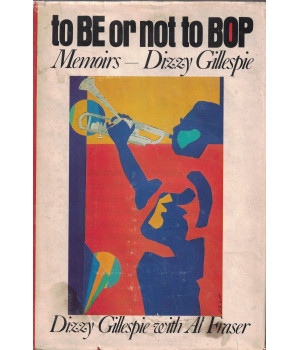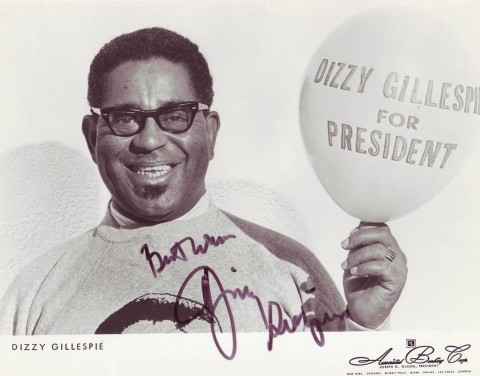The National Endowment for the Arts hadn’t been established when Dizzy Gillespie ran for President in 1964, but it would just as likely have been on his agenda as it was Lyndon Johnson’s. Given the names that Gillespie ruminated over for Cabinet and other administration posts, and his plan to levy a tax on jukebox operators as a way of supporting the “hiring of live musicians,” enhanced support of music and the arts ranked high on his list of priorities.

As he relates in his autobiography, To Be or Not to Bop, John Birks Gillespie would have proposed replacing the title Secretary with the “more appropriately dignified ‘Minister’,” and he planned to name Duke Ellington Minister of State. Miles Davis would have been offered the helm at Treasury; Louis Armstrong at Agriculture, “because he knows all about raising those crops;” Peggy Lee at Labor; Ella Fitzgerald at HEW; and Thelonious Monk as a Roving Ambassador Plenipotentiary. Dizzy wanted Charles Mingus as his Minister of Peace, “because he’ll take a piece of your head faster than anyone I know.” He envisioned Ray Charles as head of the Library of Congress, and joked about naming Ross Barnett, the segregationist Senator from Mississippi, head of the United States Information Agency office in the Congo. Jon Hendricks, who wrote lyrics for the “Dizzy for President” theme, was his choice for Poet Laureate, while Mary Lou Williams, the convert who composed “Mary Lou’s Mass,” was his obvious choice for Ambassador to the Vatican.

“Dizzy for President” comes to mind as New Hampshire holds its primary elections today, and as the NEA inducts five more Jazz Masters at a ceremony at Jazz at Lincoln Center tonight. It was LBJ’s Great Society initiative that led to the Congressional act establishing the NEA in 1965 and at various times the agency has been a political hot potato. Jazz Masters was established in 1982, and Gillespie, Roy Eldridge, and Sun Ra were its first honorees; the award includes a $25,000 gift which fell under the ax of last year’s federal budget cuts, but for the time being it’s been restored.
Tonight’s honorees include tenor saxophonist Von Freeman; vocalist Sheila Jordan; bassist Charlie Haden; trumpeter Jimmy Owens; and drummer Jack DeJohnette. Given their instrumentation, they’d sound great as an all-star quartet with vocalist, but word is that 88-year-old Freeman won’t be making the trip from his home in Chicago. Owens, who’s just released an outstanding set entitled The Monk Project, is receiving the special award for jazz advocacy that’s named for the journalist A.B. Spellman. Owens spearheaded the establishment of the Jazz Musicians’ Emergency Fund to help individual musicians with medical, financial, and housing assistance.
As for Dizzy’s presidential ambitions, they grew out of a novelty campaign that music publicist Al Fraser worked up for Gillespie’s appearance at the Monterey Jazz Festival. Fraser’s agency Associated Booking Corporation issued Dizzy Gillespie for President buttons initially as a “publicity gag,” but Dizzy’s high profile involvement in the 1963 March on Washington for Jobs and Freedom led to a grass roots effort to place his name on the ballot in California. San Francisco-based journalist Ralph J. Gleason and his wife Jean promoted a write-in campaign whose slogan read: “Gillespie for President: Because We Need One.” Gillespie’s supporters also parodied the Goldwater campaign’s famous slogan, “In my heart, I know Diz is right.”
Gillespie, of course, never got to promote his ideal of “bringing together the peoples of the world so that all wars may cease,” from the Oval Office, but he headlined the White House Jazz Festival in 1978 where he and Max Roach persuaded a scat-singing President Carter to join them for an uproarious rendition of “Salt Peanuts.” In the mid-‘80’s, Dizzy furthered his vision of world unity when he founded the United Nation Orchestra. Gillespie died in 1993; here’s my write-in vote for his musical legacy, may it forever transcend politics and exemplify ideals of freedom, equality and love.